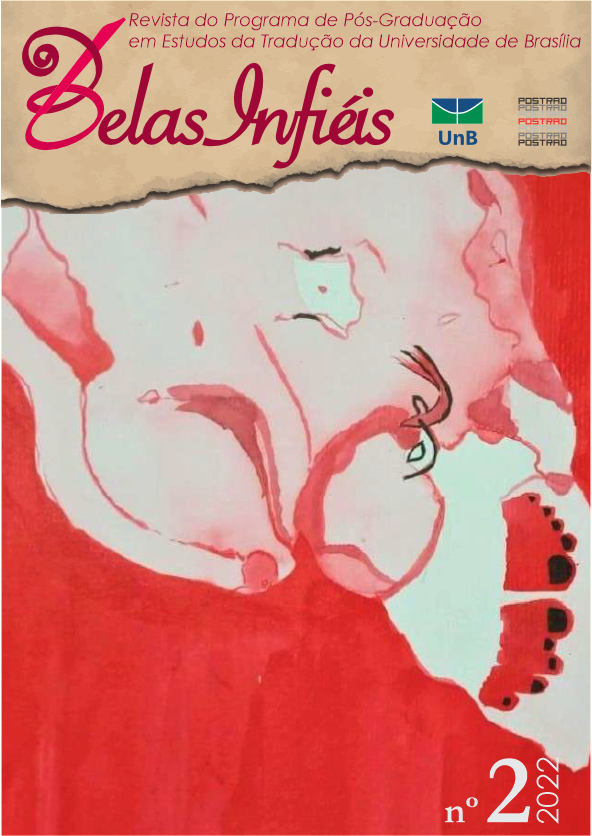A tradução de contos de escritoras hispano-americanas ao português brasileiro
DOI :
https://doi.org/10.26512/belasinfieis.v11.n2.2022.42872Mots-clés :
Estudos de Tradução. Tradução literária. Binômio português / espanhol.Résumé
Esta resenha apresenta um projeto realizado em uma universidade brasileira, com exemplos de problemas de tradução e uma reflexão sobre a tradução de contos de autoras que se destacaram em seus países – Argentina e Venezuela – no final do século XIX e início do século XX e que não ganharam projeção literária no Brasil, pois elas não tiveram, com raras exceções, suas obras traduzidas e publicadas em português. Com o objetivo de dar visibilidade a essas escritoras e promover pesquisas sobre a literatura latino-americana no Brasil, um grupo de quinze professores universitários de várias regiões do Brasil traduziu, ao português brasileiro, contos dessas autoras – e também de Bolívia, Chile, Colômbia, Cuba, Costa Rica e Peru – para formar a Antologia do conto feminino hispano-americano (editora LiberArs, no prelo). Os referencias teóricos são baseados nos Estudos Descritivos da Tradução (EDT), de Gideon Toury (1980), por proporem o reconhecimento da literatura como um sistema cultural que inclui a situação histórica, cultural e social do texto. Também se consideram os estudos enunciativos baseados em Mikhail Bakhtin (2003), que considera o fato literário como uma forma ideológica e, consequentemente, é o reflexo linguístico das ideologias sociais, elemento fundamental neste projeto, dada a distância temporal entre os originais e as traduções e certos elementos que condicionaram a tradução nos termos de Christiane Nord (1991), baseada na Teoria das Normas, de Toury (2004).
Téléchargements
Références
Torres y Quiroga, Raymunda. La cruz de brillantes (87-105). En: Abraham, C. (org.). (2016). Cuentos Fantásticos Argentino del siglo XIX. Buenos Aires: Fundación CICCUS.
Arambel-Guiñazú, María Cristina, & Martín, Claire Emilie (2001). Las mujeres toman la palabra. Escritura femenina del siglo XIX en Hispanoamérica (v. I). Madrid/Frankfurt: Iberoamericana/Vervuert.
Assis, Machado de. Pílades e Orestes. Recuperado a partir de http://www.dominiopublico.gov.br/download/texto/bv000252.pdf
Bajtín, Mijaíl. (2003). Estética da criação verbal. Trad. Paulo Bezerra. 4. ed. São Paulo: Martins Fontes.
Batticuore, Graciela. (1992). Juana Manuela Gorriti. Escribir el cuerpo. V de Vian. (N.6), 32-33. Recuperado a partir de https://www.ahira.com.ar/ejemplares/v-de-vian-n-6/
Batticuore, Graciela. (2005). “Construcción y convalidación de la escritora romántica. Hacia la profesionalización.” La Mujer Romántica – autoras y escritores en la Argentina: 1830-1870. (275-332). Buenos Aires: Edhasa.
Buret, María Florencia (2017). La encrucijada feminista en la escritura de Raymunda Torres y Quiroga. Plurentes. Artes y Letras, n. 7, 17 may 2017. Recuperado a partir de https://revistas.unlp.edu.ar/PLR/article/view/1380
Calcaño, Pepita. El pozo de los ángeles. El Cojo Ilustrado. Caracas, Venezuela. 15 abr. 1893, año II, n. 32.
Evan-Zohar, Itamar (1990). Polysystem studies. Recuperado a partir de http://www.tau.ac.il/~itamarez/works/books/ez-pss1990.pdf
Fombona, Ignacia Pachano de. Abnegación. El Cojo Ilustrado. Caracas, Venezuela. 1º feb. 1895, año IV, n. 75.
Gorriti, Juana Manuela (2017). Contos. São Paulo, Brasil: LiberArs.
Lefevere, André (1997). Traducción, reescritura y la manipulación del canon literario. Trad. de Ma. Carmen África Vidal y Román Álvarez. Salamanca: Ediciones Colegio de España.
Moya, Virgilio (2000). La traducción de los nombres propios. Madrid: Cátedra.
Nord, Christiane (1991). Text Analisis in Translation. Theory, Methodology and Didactic Application of a Model for Translation-Oriented Text Analysis. Amsterdam: Rodopi.
Sobral, Adail. (2008). Dizer o mesmo a outros - ensaios sobre tradução. São Paulo: SBS.
Toury, Gideon (1980). Search of a Theory of Translation. Tel Aviv: Tel Aviv University.
Toury, Gideon. (2004). Los estudios descriptivos de traducción y más allá. Metodología de la investigación en estudios de traducción. Trad. de Rosa Rabadán y Raquel Merino. Madrid: Cátedra, 2004.
Téléchargements
Publié-e
Comment citer
Numéro
Rubrique
Licence
(c) Tous droits réservés CC BY 2022

Cette œuvre est sous licence Creative Commons Attribution 4.0 International.
Copyright Statement
Given the public access to this journal, the texts are free to use but requires the recognition of the original authorship and initial publication in this journal to be properly stated.
The journal allows the use of works published for non-commercial purposes, including the right to submit the work to publicly accessible databases. Published contributions are the sole and exclusive responsibility of the author(s).
- When submitting papers to be evaluated by the Belas Infiéis journal, the author(s):
- Declare that the contents of the contributions are original and of their original creation, being entirely responsible for their content if there is an objection by third parties.
- Claim to be aware that they should not commit academic plagiarism.
- Declare that the manuscript has not been published, completely or partially, in Portuguese or another language. If it is a translation it should be submitted to the Translated Articles section.
- Declare that the manuscript is not being evaluated by other journals.
- Declare that the manuscript was not submitted to another journal simultaneously.
- Commit(s) to inform the journal of any kind of error or inaccuracy in their contribution (published, in evaluation or in editing) and to collaborate with the editors to make due corrections of the article (when in evaluation or editing) or erratum/retraction (after publication).
- Declare that there is no conflict of interest regarding the published work.
- Authorize its release if it is accepted for publication without any kind of monetary compensation.
- Agree to assign non-exclusive rights to publication to the magazine, remaining free to make their contribution available in other media as long as the publication of the first version in Belas Infiéis magazine is mentioned. They also authorize Belas Infiéis to assign their texts for reproduction in content indexers, virtual libraries and similar platforms.
- Maintain copyright and grant the journal the right of first publication, the work being licensed under theCreative Commons Attribution License.
- Is/Are allowed and encouraged to publish and distribute their work online after the editorial process, which may increase the impact and citation of the published work.
- Authorize the editorial team to make textual adjustments and to adapt the article to the publication rules, when necessary.



















